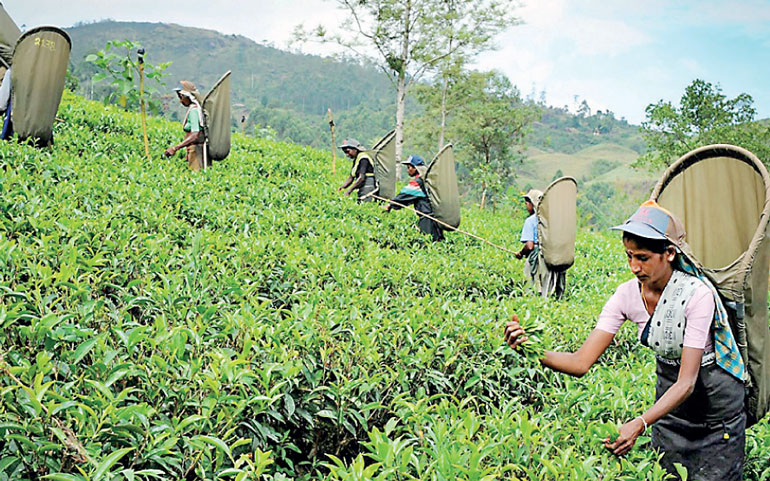Wednesday Feb 18, 2026
Wednesday Feb 18, 2026
Friday, 19 August 2016 00:02 - - {{hitsCtrl.values.hits}}

Plantation companies are plucking losses with the crisis over prices, costs and wages threatening the industry’s survival.
Sources said Regional Plantation Companies (RPCs) have lost Rs. 2 billion from tea and Rs. 1 billion from rubber in the first half of this year. The impact is on top of Rs. 5.5 billion lost from tea and Rs. 1 billion from rubber in 2015. This was as a result of high grown tea prices dipping by Rs. 66 per kilo from January 2014 to December 2015, while rubber RSS1 prices declined by Rs. 115 from 2014 to 2015.
After meeting the Government’s request for the payment of an interim allowance to estate workers for June and July 2016, the RPCs have called on the estate sector trade unions to fulfil their obligation as per the understanding reached between them, the Government and the RPCs, by entering into an output/productivity based Collective Agreement for the remuneration of workers.
Despite severe financial constraints as a result of incurring huge losses on both tea and rubber for many consecutive months, considering the aspirations of the workers and at the request of the government, the RPCs agreed to pay a Rs. 100 per day interim allowance to their workers for two months – by utilising loans provided by State Banks via the Tea Board.
The payment, which for all RPCs for both months added up to Rs. 800 million, was on the understanding that a new Productivity-Based Collective Agreement (in which estate workers will be remunerated based on output) will be signed in August 2016.
After making the interim allowance payment for June and after paying the July interim allowance on 5 August, the RPCs are now calling on the trade unions and the Government to fulfil their obligation (as part of the understanding). The RPCs have emphasised the importance of moving from the present 150-year-old archaic attendance-based wage system, which has led to escalation of costs – particularly as it does not provide sufficient incentive for workers to increase output.
“Moving to a productivity-based system, which is the norm in the plantation sector around the world, as soon as possible is critical for the sustainability of the industry,” Roshan Rajadurai, the Chairman of the Planters’ Association of Ceylon – which represents the Regional Plantation Companies (RPCs) – said.
“The RPCs, many of which are listed entities, will not be able to justify continuous losses to their shareholders and cannot continue to operate in this manner. Immediate action is required to put the industry on a more sustainable footing. We are fast approaching a stage in which the revenue earned will be inadequate to pay even the workers’ wages because of low crops and reduced tea/rubber prices.”
Pointing out that the RPCs are unable to provide a wage increase to workers via the present attendance-based wage system, amidst increasing cost of production and plummeting prices for their produce which has led to losses, the RPCs have presented several alternative proposals which would enable workers to earn their desired income by increasing output. These have however been rejected by the unions who demand for a wage increase via the present system, without taking ground realities into account.
Sources said the loss-making situation had been exacerbated by certain policy changes. For instance, the Government’s decision to ban weedicides has adversely affected the availability of crop – thereby reducing the output of the workers. This has also increased the cost of removal of weeds, which now has to be done via manual labour, resulting in an additional annual expenditure of Rs. 2 billion. Recent weather conditions have not been conducive either and as a result crop has reduced, putting further strain on the RPCs.
The RPCs have reiterated that since labour costs account for 67%-70% of the total, cost of production of tea cannot be reduced without substantial increases in labour productivity, in terms of which Sri Lanka lags behind significantly in comparison with its competitors. Despite there being no great difference in terms of yield of tea fields between the two nations, in Assam in India the daily plucking average of a worker is in the region of over 30kg, while in Sri Lanka it is substantially lower at around 18kg.
This is since a Sri Lankan tea plucker only spends around 40% of the total working time on the actual act of plucking. Therefore there is significant potential for output to be increased without an increase in the overall working time.
The productivity-based remuneration method, which has been proposed by the RPCs, has proven to be a success at the RPC estates in which the system has been implemented to a certain extent. The outcome has been mutually-beneficial for both the plantation company and the workers.